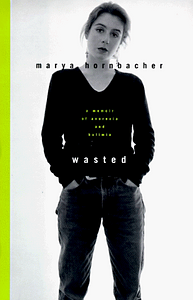You need to sign in or sign up before continuing.
Take a photo of a barcode or cover
I read this book ages ago when it first came out in the 90s. At the time, Marya thought her eating disorder was the problem. It took many more years to discover she was manic depressive. Her story traces a common trajectory for women struggling with bipolar disorder, a newish name for an ancient illness. I highly recommend her books for sufferers and especially clinicians.
Honestly, I'm not sure how to review this book. In some respects, yes, it's quite a good book. In other respects, I desperately wish that this was not the one book about eating disorders that I am sure to find in any library.
The author is clearly a talented writer. I'm not disputing that, and in other circumstances I might give the book a higher rating for that reason. The book is, however, pretty self-indugent and self-important.
The author doesn't hold back. I appreciate that in memoirs. It is, however, an extremely triggering book. I own this book, but I don't keep it in my bookcase: I keep it piled under sweaters in my closet. I don't need to be tempted every time I look for a book to read. It's probably a good read for people who don't have (or lean towards) eating disorders, but it runs the risk of letting people think that an eating disorder isn't serious if the individual isn't 52 pounds. It's definitely not a healthy book for the eating-disordered.
It's an interesting book. It's just not one that I would recommend.
Original review August 2010; ETA April 2015: Just ran across this review from 1998. Worth linking to here for its perspective.
The author is clearly a talented writer. I'm not disputing that, and in other circumstances I might give the book a higher rating for that reason. The book is, however, pretty self-indugent and self-important.
The author doesn't hold back. I appreciate that in memoirs. It is, however, an extremely triggering book. I own this book, but I don't keep it in my bookcase: I keep it piled under sweaters in my closet. I don't need to be tempted every time I look for a book to read. It's probably a good read for people who don't have (or lean towards) eating disorders, but it runs the risk of letting people think that an eating disorder isn't serious if the individual isn't 52 pounds. It's definitely not a healthy book for the eating-disordered.
It's an interesting book. It's just not one that I would recommend.
Original review August 2010; ETA April 2015: Just ran across this review from 1998. Worth linking to here for its perspective.
dark
hopeful
informative
sad
fast-paced
emotional
tense
medium-paced
This is the true and personal story of a young woman's experience with the dark and dangerous world of bulimia and anorexia. And it's told in a direct, take-no-prisoners way that makes the story truly compelling.
Marya Hornbacher became bulimic at the age of 9. It was a conscious decision on her part, a way to take control of something in her life amidst all the chaos she felt swirling around her. Bingeing and purging became a part of her, something she needed to stay sane, almost, something she needed to feel calm. Throwing up soothed the rough edges and made her feel serene. If there was nothing else she could influence, she could influence this. And she became good at it. For years she honed her skills, hiding it from her friends and family, worrying about how she would manage to keep up her routine of eating and vomiting when she was in a new place, surrounded by new people who didn't know her secret. Her entire life, as it tends to do with bulimics and anoretics ('anorexic' is an adjective, 'anoretic' is a noun), revolved around her completely dysfunctional relationship with food. And then. Then she made an even more fateful and dangerous decision: She would become anorexic. She would embrace the life completely, throw herself into to whole-heartedly. The point wasn't so much to lose weight. The point was to lose herself, to disappear, to become invisible. To be free from her body and all its base needs that made a person weak.
I don't have an eating disorder. I don't know anyone who does (that I'm aware of). I cannot relate to this woman at all, and yet, I found her story incredibly moving. The motivations behind eating disorders are numerous and varied and the author doesn't claim to explain everyone's reasons for continuing on a path that could eventually kill them. All she can claim to be an expert on are her own reasons. And she describes them in a way that is magnetic and almost painful. Her descriptions are sharp and visceral, her style blunt and unapologetic. She talks about things that most people would never share with another living soul, and as you're reading, you want to cringe. She gets pregnant when she's fourteen, has a miscarriage. Gets pregnant again when she's sixteen and throws herself down the stairs, causing another miscarriage. She uses sex and drugs and nicotine to ease the hunger pains that she feels are a weakness. If only she could rise above hunger, she'd be okay. She's a workaholic and an overacheiver. She hates herself and knows she's the reason why she is the way she is; it's too easy, after all, to blame her parents. If they'd only loved her enough, loved each other enough, loved themselves enough, she wouldn't have the urge to destroy herself. No, she says. It's me. Ultimately, I'm the one in control of my own life.
The thing that struck me the most about this book is the way Hornbacher made a conscious, calculated decision to kill herself slowly. No overdose or bullet to the brain for her. No, she wanted to disappear gradually, to disintegrate into nothing, to dissipate into the ether of Anywhere But Here. She had set the lofty goal of death by centimeters (or in this case, ounces) and was going to see it through.
Until one day, she decided to live.
She weighed 52 pounds (she was 19 years old). She was given a week to live. And she decided that if she could set her sights on death, she could also set her sights on life. She had never looked at it that way before. A revelation.
This book was written when Hornbacher was 23 years old. She's in her late 30s now and she daily has to live with the consequences the years of abuse brought to her body: heart problems, osteoporosis, infertility. But she's alive. And the most important thing about that is: She wants to be.
This book was riveting. I simply could not put it down.
Marya Hornbacher became bulimic at the age of 9. It was a conscious decision on her part, a way to take control of something in her life amidst all the chaos she felt swirling around her. Bingeing and purging became a part of her, something she needed to stay sane, almost, something she needed to feel calm. Throwing up soothed the rough edges and made her feel serene. If there was nothing else she could influence, she could influence this. And she became good at it. For years she honed her skills, hiding it from her friends and family, worrying about how she would manage to keep up her routine of eating and vomiting when she was in a new place, surrounded by new people who didn't know her secret. Her entire life, as it tends to do with bulimics and anoretics ('anorexic' is an adjective, 'anoretic' is a noun), revolved around her completely dysfunctional relationship with food. And then. Then she made an even more fateful and dangerous decision: She would become anorexic. She would embrace the life completely, throw herself into to whole-heartedly. The point wasn't so much to lose weight. The point was to lose herself, to disappear, to become invisible. To be free from her body and all its base needs that made a person weak.
I don't have an eating disorder. I don't know anyone who does (that I'm aware of). I cannot relate to this woman at all, and yet, I found her story incredibly moving. The motivations behind eating disorders are numerous and varied and the author doesn't claim to explain everyone's reasons for continuing on a path that could eventually kill them. All she can claim to be an expert on are her own reasons. And she describes them in a way that is magnetic and almost painful. Her descriptions are sharp and visceral, her style blunt and unapologetic. She talks about things that most people would never share with another living soul, and as you're reading, you want to cringe. She gets pregnant when she's fourteen, has a miscarriage. Gets pregnant again when she's sixteen and throws herself down the stairs, causing another miscarriage. She uses sex and drugs and nicotine to ease the hunger pains that she feels are a weakness. If only she could rise above hunger, she'd be okay. She's a workaholic and an overacheiver. She hates herself and knows she's the reason why she is the way she is; it's too easy, after all, to blame her parents. If they'd only loved her enough, loved each other enough, loved themselves enough, she wouldn't have the urge to destroy herself. No, she says. It's me. Ultimately, I'm the one in control of my own life.
The thing that struck me the most about this book is the way Hornbacher made a conscious, calculated decision to kill herself slowly. No overdose or bullet to the brain for her. No, she wanted to disappear gradually, to disintegrate into nothing, to dissipate into the ether of Anywhere But Here. She had set the lofty goal of death by centimeters (or in this case, ounces) and was going to see it through.
Until one day, she decided to live.
She weighed 52 pounds (she was 19 years old). She was given a week to live. And she decided that if she could set her sights on death, she could also set her sights on life. She had never looked at it that way before. A revelation.
This book was written when Hornbacher was 23 years old. She's in her late 30s now and she daily has to live with the consequences the years of abuse brought to her body: heart problems, osteoporosis, infertility. But she's alive. And the most important thing about that is: She wants to be.
This book was riveting. I simply could not put it down.
I had a love/hate relationship with this book. I knew I shouldn't have been reading it but I enjoyed having someone that understood as if she were my friend, which was important at the time. She was so honest throughout, which made it more haunting and accurate. Although I did have to read it over a span of a couple months because it was too much to handle all at once. Just a warning to anyone else recovering or trying to overcome ED. Perfect book for others who want to better understand the thought process.
It has been a LONG time since I read this, but I do remember liking it when recovering from an eating disorder... and I didn't find it triggering..... But I WASN'T an easily triggered person. I think it gives and interesting insight to eating disorders as well. if you know someone struggling but you can't relate to what they are going through, I would recommend you read this. She is very raw and has a knack for explaining the dark parts of an eating disorder. I do NOT recommend this for someone struggling or trying to recover though because some people are easily triggered.
I cannot begin to explain the attachment I have to this author and her autobiography. I've read this 3 times, once writing notes and highlighting my favourite quotes. When I look back at that book (I have two copies, thanks to a friend who thought one should be kept new and the other, written-in-book, as a personal copy) I only find that every page is filled with incredible and true thoughts of a woman bleeding her soul out on holy paper. Everything this author writes is honest about anorexia, bulimia, and bi-polar disorder.
This will always be my favorite novel. Always.
This will always be my favorite novel. Always.
I was really impressed by this. Marya is an excellent writer and manages to avoid the self-indulgence that is so common amongst memoir writers. Her account is gritty and true-to-life.
emotional
reflective
sad
medium-paced
Graphic: Eating disorder






